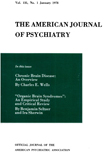INTELLECTUAL AND AFFECTIVE CHANGES IN ESSENTIAL HYPERTENSION
Abstract
The Rorschach test was administered to 3 diagnostic groups of patients with neurosis, organic brain-damage, and essential hypertension. The subjects were individually matched with respect to color, sex, age, formal education, and I. Q. Intergroup statistical comparisons were made of the mean values on each of the Rorschach variables. The relative frequencies of Rorschach " signs" of organic cerebral damage in the 3 groups were compared using the chi-square technique. The results indicate that the mean scores of the hypertensive group consistently fall between those of the other 2 groups. The Rorschach " signs" of brain damage occur more frequently in the brain-damage than hypertensive group, but there was no significant difference in this respect between the hypertensives and neurotics. An interpretative review of the protocols in the 3 groups indicates a considerable amount of neurotic symptomatology in each group, but confirms the quantitative results which indicated intellectual impairment due to organic brain damage in some of the patients with essential hypertension.
Access content
To read the fulltext, please use one of the options below to sign in or purchase access.- Personal login
- Institutional Login
- Sign in via OpenAthens
- Register for access
-
Please login/register if you wish to pair your device and check access availability.
Not a subscriber?
PsychiatryOnline subscription options offer access to the DSM-5 library, books, journals, CME, and patient resources. This all-in-one virtual library provides psychiatrists and mental health professionals with key resources for diagnosis, treatment, research, and professional development.
Need more help? PsychiatryOnline Customer Service may be reached by emailing [email protected] or by calling 800-368-5777 (in the U.S.) or 703-907-7322 (outside the U.S.).



